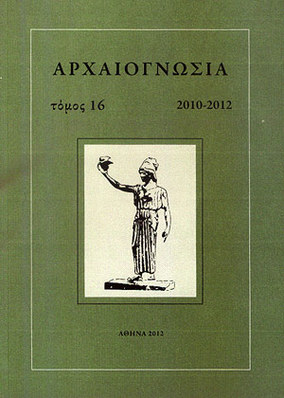Κριτικές παρατηρήσεις στη μυθιστορία του Αισώπου
Part of : Αρχαιογνωσία ; Vol.11, No.1-2, 2001, pages 73-86
Issue:
Pages:
73-86
Parallel Title:
Critical observations on the Aesop romance
Section Title:
Μελέτες-Articles
Author:
Abstract:
This paper deals with five problematic passages of the Perriana version (or Vita G) of the Aesop Romance.1. The reading υλωος of cod. G (f. 22r, 6 = Perry, ch. 1, p. 35, note 5), which Perry changed to βλαισός,, is corrected to κυλλός. Perry’s correction, although it has been adopted by the subsequent editors, is not satisfactory stemmatically, since the Pianudea version, which gives us the reading βλαισός, descends from the Wester- manniana version and not from the Perriana. Our correction is easily justified palaeographically, since the resemblance with the reading υλωος is clear. On the other hand, the meaning of the word κυλλός (= «bandy legged») fits the context.2. The phrase πεπλανημένην με δείξον την οδόν μοι (G, f. 23Γ, 20 = Perry, ch. 4, p. 36, 18-19) was corrected by Perry to πεπλανημενη μοι δείξον την οδόν [μοι]. Μ. Papathomopoulos kept in his edition the reading of G, because he considered that the participle is here accusative absolute. It is, however, hard to agree with this explanation, because the existence of the accusative absolute in the texts of the Koine is at least dubious and, on the other hand, it does not occur anywhere else in the Perriana. If the reading of G is accepted as it stands, another explanation is needed. Such an explanation is put forth on p. 79, note 38.3. The reading ÔKoâ<f lc (G, f. 33r, 9 = Perry, ch. 28, p. 45, 16), which Perry has bracketed, is corrected to έκροάς by Papathomopoulos and translated in a hardly comprehensible or convincing way (= «it blocks the pores of my body»). The correction is not persuasive, and we propose a correction to πνοάς. This is palaeographically easy, while the meaning of this word (= «breathing») fits the context.4. The corrupt reading ένακμάται (G, f. 58Γ, 25 = Perry, ch. 103, p. 67, 17) was retained by Perry in his edition in the absence of an appropriate emendation. Corrections were subsequently proposed by other scholars. Starting from Papa- demetriou’s criticism of the corrections put forth thus far, we propose a correction to ένάπτεται. This correction is justified palaeographically, while the verb “ένάπτο- μαι” as a middle verb governing the accusative, with the meaning “to be fitted with/clad in” (metaphorically), fits the context. Also the etymologic and semantic relation between the verb ένάπτεται and the participle άπτόμενος, which precedes it as subject of the verb, speaks for our correction.5. The reading περιμενούσης (G, f. 61v, 2-3 = Perry, ch. 115, p. 70, 33), which Perry kept in his edition and Papathomopoulos corrected to περί έμε ουσης, is problematic, since it does not give us the meaning which the context demands. We propose a correction to παραμενούσης. The participle παραμενούσης is palaeographically easily explained and gives us the meaning that is expected.
Subject (LC):
Keywords:
αρχαία ελληνική λογοτεχνία




